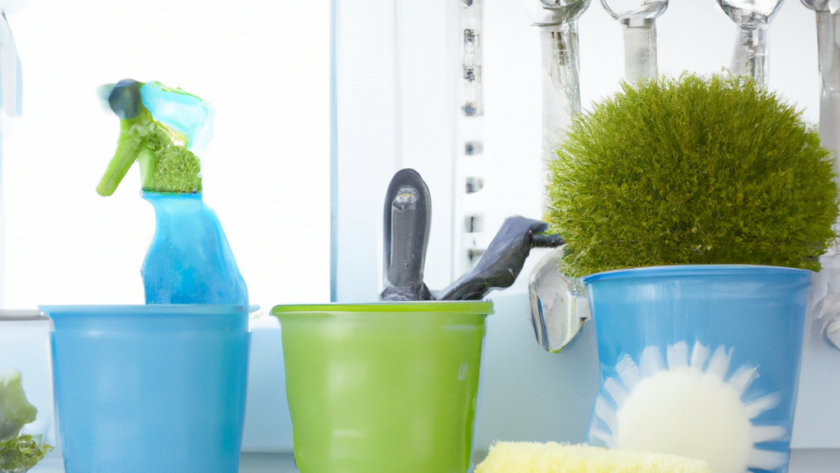Introduction
Cleaning is an essential part of everyday life, but not all cleaning hacks work as advertised. Although many cleaning hacks are touted as efficient and effective, they often fall short of expectations. In this article, we’ll take a closer look at eight cleaning hacks that don’t actually work and why.
1. Using Vinegar to Clean Grout
Vinegar has long been a go-to ingredient for cleaning, but it’s not as effective for cleaning grout as you might think. The acidic nature of vinegar may help to remove some dirt and grime from grout lines, but it won’t penetrate deep enough to fully remove stubborn stains.
2. Cleaning Cast Iron with Salt
Cast iron is a versatile and durable material, but it requires special care to maintain its condition. Cleaning cast iron with salt is a popular hack, but it can actually cause more harm than good. Salt is abrasive and can scratch the surface of cast iron, leaving it vulnerable to rust and damage.
3. Using Baking Soda to Remove Carpet Stains
Baking soda is a versatile cleaner, but it’s not always the best solution for removing carpet stains. While baking soda can help to lift surface dirt and grime, it doesn’t have the ability to penetrate deep into carpet fibers to remove stubborn stains.
4. Cleaning Windows with Newspaper
Newspaper is a cheap and readily available item, but it’s not the best choice for cleaning windows. The ink from the newspaper can transfer onto the glass, leaving streaks and smudges that are difficult to remove.
5. Using Lemon Juice to Remove Hard Water Stains
Lemon juice is a natural cleaner, but it’s not always the best solution for removing hard water stains. While lemon juice can help to dissolve some of the minerals in hard water, it won’t remove the stains completely.
6. Cleaning Silverware with Aluminum Foil
Silverware is a valuable and delicate material, but cleaning it with aluminum foil is a bad idea. Aluminum foil can react with silver, causing it to discolor and tarnish.
7. Using Toothpaste to Clean Jewelry
Toothpaste is a common household item, but it’s not the best choice for cleaning jewelry. Toothpaste can be abrasive and can scratch delicate materials like gold and silver.
8. Cleaning Oven Racks in the Dishwasher
Cleaning oven racks in the dishwasher is a popular hack, but it’s not always the most effective solution. Oven racks are often coated with a protective layer that can be damaged by the harsh detergents and high heat of the dishwasher.
Conclusion
Cleaning is an important part of everyday life, but not all cleaning hacks are created equal. The eight hacks listed above are popular, but they don’t actually work as advertised. Before trying any new cleaning hack, it’s important to consider the potential consequences and whether it’s the best solution for your cleaning needs.
Why Cleaning Hacks Fail
Many cleaning hacks fail because they don’t take into account the specific characteristics of the material being cleaned. For example, vinegar is an effective cleaner for some surfaces, but it can damage others. Similarly, baking soda is a mild abrasive that is good for some things, but not for others.
Another reason that cleaning hacks can fail is that they are often based on anecdotal evidence rather than scientific research. People share cleaning hacks because they’ve tried them and they seem to work, but they may not have tested them rigorously or compared them to other cleaning methods.
Finally, cleaning hacks can also fail because they don’t address the root cause of the problem. For example, using lemon juice to remove hard water stains might help to dissolve some of the minerals in the water, but it doesn’t address the underlying problem of hard water buildup.
Better Alternatives
If you’re looking for more effective cleaning solutions, consider turning to more traditional cleaning methods. For example, using a specialized cleaner for grout, cast iron, or carpet stains can be more effective than using household items like vinegar or baking soda.
Additionally, consider using microfiber cloths instead of traditional cleaning rags. Microfiber cloths are more effective at removing dirt and grime, and they are less likely to leave streaks or smudges.
Conclusion
Cleaning hacks can be tempting, but they don’t always work as advertised. Before trying any new cleaning hack, consider the specific characteristics of the material you’re cleaning, the evidence behind the hack, and whether there are better alternatives available. By taking a more thoughtful approach to cleaning, you can get better results and avoid damaging your surfaces or belongings.




